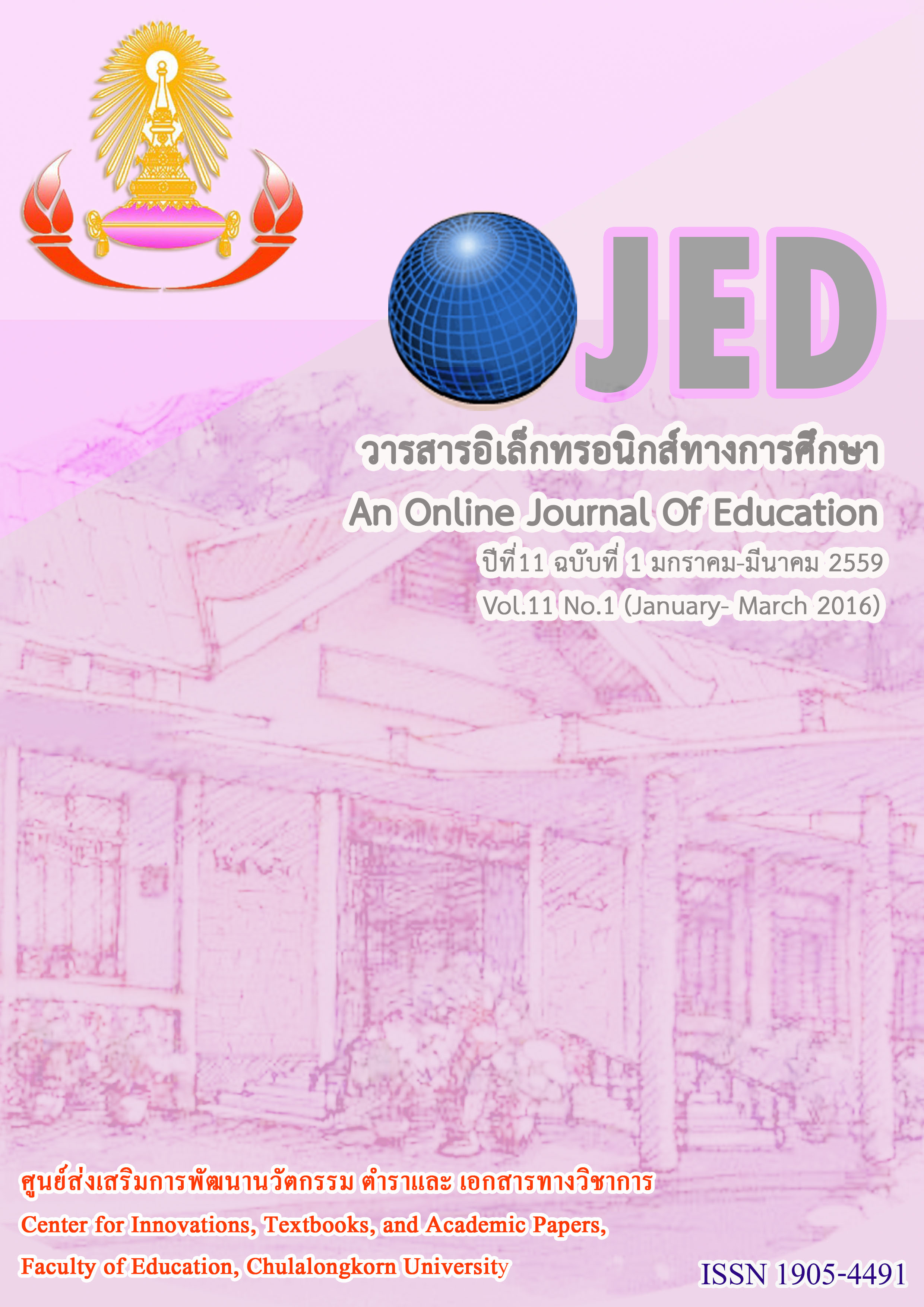ผลของการใช้ละครเชิงสังคมที่มีต่อการเข้าใจความรู้สึกผู้อื่นของเด็กอนุบาล EFFECTS OF USING THE SOCIODRAMA ON KINDERGARTENERS’ EMPATHY
Keywords:
ละครเชิงสังคม, การเข้าใจความรู้สึกผู้อื่น, การเข้าใจอารมณ์, เด็กอนุบาล, SOCIODRAMA, EMPATHY, EMOTIONAL UNDERSTANDING, KINDERGARTENERAbstract
วัตถุประสงค์ของวิจัยครั้งนี้ เพื่อศึกษาผลของการใช้ละครเชิงสังคมที่มีต่อการเข้าใจความรู้สึกผู้อื่นของเด็กอนุบาล กลุ่มตัวอย่าง คือ เด็กชั้นอนุบาลปีที่ 2 โรงเรียนวัดสังข์กระจาย (แจ่มวิชาสอน) สังกัดสำนักงานเขตพื้นที่การประถมศึกษา กรุงเทพมหานคร เขต 3 จำนวน 15 คน ได้มาจากการเลือกแบบเจาะจง งานวิจัยนี้เป็นการวิจัยแบบย้อนกลับ ระยะเวลาที่ใช้ในการวิจัย 12 สัปดาห์ ผู้วิจัยสร้างแผนการใช้ละครเชิงสังคม จำนวน 40 แผน แต่ละแผนประกอบด้วย 4 ขั้นตอน ได้แก่ 1) การฟังเรื่องราว 2) การสนทนา 3) การร่วมเล่นละคร และ 4) การสะท้อนประสบการณ์ เครื่องมือที่ใช้ในการวิจัย ได้แก่ แบบวัดการเข้าใจความรู้สึกผู้อื่นของเด็กอนุบาล และแบบสังเกตพฤติกรรมการเข้าใจความรู้สึกผู้อื่นของเด็กอนุบาล วิเคราะห์ข้อมูลโดยหาค่าเฉลี่ย ส่วนเบี่ยงเบนมาตรฐาน และทดสอบค่าที เพื่อเปรียบเทียบค่าเฉลี่ยของคะแนนในระยะทดลอง 3 คู่ ได้แก่ 1) ระยะเส้นฐาน (A1) กับระยะทดลอง (B1) 2) ระยะย้อนกลับ (A2) กับระยะทดลอง (B2) และ 3) ระยะทดลอง (B1) กับระยะทดลอง (B2)
ผลการวิจัย พบว่า หลังการใช้ละครเชิงสังคม กลุ่มตัวอย่างมีค่าเฉลี่ยของคะแนนการเข้าใจความรู้สึกผู้อื่นสูงขึ้นอย่างมีนัยสำคัญทางสถิติที่ระดับ .01 ทั้ง 3 คู่ระยะทดลอง โดยการเข้าใจความรู้สึกผู้อื่นในด้านความคิด มีค่าเฉลี่ยของคะแนนเพิ่มขึ้นในทุกระยะทดลอง ส่วนด้านความรู้สึกและด้านความเห็นใจ มีค่าเฉลี่ยของคะแนนเพิ่มขึ้นในระยะทดลอง (B1) และ (B2) แต่เมื่อหยุดการใช้ละครเชิงสังคมในระยะย้อนกลับ (A2) พบว่า ค่าเฉลี่ยของคะแนนลดลง
The purpose of this research was to study the effects of using the sociodrama on kindergarteners’ empathy. The samples were 15 kindergarteners of K2 class at Watsangkrajai (Chamwichason) school under Bangkok primary educational service area office 3. The purposive sampling was used to select the samples. ABAB design was conducted for 12 weeks and 40 lesson plans were developed by the researcher. Each plan comprised of 4 steps for using sociodrama: 1) listening to the story, 2) making discussion, 3) playing according to the role and 4) reflecting about what they learned. Research instruments were an assessment of kindergarteners’ empathy form and a kindergarteners’ empathy behavioral observational form. The arithmetic mean, standard deviation and t-test were used to analyze the data by comparing 3 pairs of research phases: 1) baseline period (A1) and treatment measurement period (B1), 2) withdrawal of treatment period (A2) and re-introduction of treatment period (B2), and 3) treatment measurement period (B1) and re-introduction of treatment period (B2).
After the experiment, the samples had higher mean scores of empathy at .01 significant level in 3 pairs of research phases. Mean score of cognitive empathy’s increased in every period while mean score of emotional empathy and compassionate empathy increased in treatment measurement period (B1) and re-introduction of treatment period (B2), but had decreased in withdrawal of treatment period (A2).




